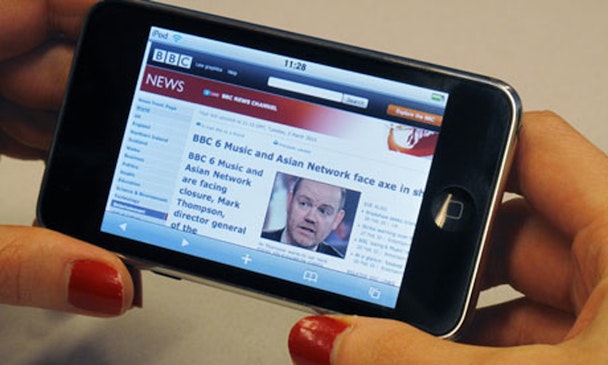BBC wants to become an ‘open platform for the internet age’
The BBC’s director general Tony Hall has mapped out the corporation’s plan for the next decade, pledging to capitalise on all online opportunities to create an “open BBC for the internet age”.

In a speech today (7 September), Hall announced the “Open BBC” plan that will would act as a “curator bringing the best from Britain’s great cultural institutions and thinkers to everyone”. This isn’t the attitude of a an “expansionist” BBC, he added in response to accusations from politicians and some UK newspapers that the BBC is using the licence fee to compete with commercial media owners domestically.
The directive will underpin the corporation’s response to the government’s review of the Royal Charter in 2016, which will greatly impact the BBC’s scope and objectives for the future.
“For the next 10 years, we will need to ride two horses – serving those who have adopted the internet and mobile media, while at the same time making sure that those who want to carry on watching and listening to traditional channels continue to be properly served too,” said Hall. “This is where the idea of an open BBC for the internet age comes from.”
Among the new initiatives to usher in this new approach are a children’s version of its iPlayer service as well as a plan to show rival shows on the streaming service. BBC reporters and content could also be offered to local newspapers as part of the sweeping changes, which also include an expansion of the World Service into North Korea and Russia and partnerships with cultural bodies.
“Britain has some of the greatest cultural forces in the world. We want to join with them working with them, working alongside them, to make Britain the greatest cultural force in the world,” said Hall. “Where Google’s mission is to organise the world’s information, ours in a smaller way would be to understand it. We will work with anyone who can help us to understand this ever more complex world.”
Another key pillar of the BBC’s reboot will be drama with the BBC all too mindful of the importance of holding onto its foothold in a market targeted for growth by the likes of Netflix and Amazon. This will see an additional £50m pumped into producing high quality drama such as Poldark, Wolf Hall and Sherlock.
Hall will be hoping the changes offer a riposte to the criticisms aimed at the BBC of late that has seen governments and newspapers insist major changes are made to curb its perceived threat to the wider media industry. And it would seem that the changes (at least those pertaining to its regional news offering) do not go far enough to ease those fears.
The Scottish Newspaper Society director John McLellan said: “The newspaper industry has previously offered to partner the BBC by sharing its content with the corporation but this plan turns that on its head. Instead of helping local new publishers, it would make the BBC even more powerful and would further concentrate coverage of news in the hands of the state-funded broadcaster.
“This plan actually goes against everything for which we’ve been arguing and just looks like the old, failed plan to hire an army of local video journalists by the back door under the guise of co-operation. Further, this announcement has been made without any consultation, certainly not in Scotland. The SNS has repeatedly asked BBC Scotland for its views on news sharing and we have been completely ignored."
Its problems with publishers aside, the BBC is bracing itself for the inevitable cuts needed to fuel its bid to become more a open, video-based service. Hall said the broadcaster had to “live within its means” and make savings of 20 per cent over the next five years, having to “inevitably” decide to either close or reduce some services.
“In the internet age our mission is simple: great British programmes and a trusted guide for every one of us,” he added. "We want to take all the opportunities the internet creates to inform, educate and entertain in new ways.And to that traditional mission we would add a fourth imperative - to enable others to do that too.”
